It happens all the time.
People ask me, “What can I do to help?”
Usually this happens after they see our data about low registration rates for 18-year-olds and high levels of turnout among registered youth.
Or it can happen after they see one of our social media posts showing what it looks like when students and educators begin to make voter registration part of their high school experience.
With the election coming up, it’s happening more and more.
High school and college students ask. Teachers ask. Parents and grandparents ask. Concerned citizens and potential donors, who recognize immediately the enormous impact young people can have if they were registered to vote at rates comparable to those of older voters, also ask.
This week - Sept. 23-27, is High School Voter Registration Week. The Civics Center created High School Voter Registration Week back in 2019, to serve as a tentpole event for high school community organizing and to draw attention to the enormous opportunities for welcoming young people into our democracy in high school.
So, what better time to answer the question that started out this post: If you are a member of one of the groups I mentioned above, here are my top ideals for what you can do to help.
Scroll down to find the answers that are best for you:
High School Students
Electoral power is your power. More than half of US teens live in states where you can preregister to vote starting at age 16. Even in more restrictive states, virtually all of you are old enough to register when you are in high school. And all of you who will be 18 by Nov. 5 are old enough to register today.
Here are the top five things you can do:
1. Learn about your power and use it. What I mean by that is: Learn the laws in your state. Learn how to organize in your high school.
2 Register to vote if you are eligible and ask your friends to do the same.
3. Sign up for an organizing training. You can even participate in our $150 gift card program when you go through our organizing training and get your school ready to vote.
4. Look up your state deadline and plan your drive accordingly. Remember, in some states, registration deadlines start as early as Oct. 7, but in other states, you can register even on election day.
5. Follow us on social media, either through your own account or a club account at your school, so you can tell everyone you know about high school voter registration.
College Students
So, you’ve already graduated from high school, registered yourself, asked all your friends and family members to register, and volunteered for one of our favorite college-focused programs.
Here’s how you can help your high school make the shift that colleges have been making for years to make sure everyone is registered.1
1. Read up on our data and the persistent, enormous gap in registration rates between younger voters and older Americans. Share what you learn with your friends. Learning how the failure to implement robust, equitable, and universal high school voter registration programs has prevented young people from having an equal voice in our democracy.
2. Realize that you and your friends are in a special position. You know who the educators are in your school, who students trust. You know who would make the best faculty advisory and be able to bring voter registration to life for your school. There is no national or statewide list of the educators teens trust or educators who care about democracy. Your knowledge is powerful.
3. Write to your favorite teacher. We have templates on our website to serve as a starting point. You can personalize them to make them great. Add in relevant points from our data (mentioned above). Tell key educators about high school voter registration and point them to special trainings and toolkits we’ve created just for them.
4. Tell student leaders. If you were involved in clubs or other activities in high school or just continue to have friendships with current students, let them know about high school voter registration. Encourage them to attend a training and to run a drive in their school.
5. Use your platform. When one person acts along, it can feel isolating. Ask five friends to take the same action you’re taking. You can follow us on social media and amplify our High School Voter Registration Week posts as a prompt.
Educators
You are key. Students graduate every year. You can provide continuity to make high school voter registration a tradition in your school, help students accomplish administrative tasks, and identify students for leadership roles in the effort.
1. Read up on our data and the persistent, enormous gap in registration rates between younger voters and older Americans. We want you to understand that existing programs are not enough. 40% of high school students do not go on to college. 40% do not get a driver's license. High school is truly the only setting capable of creating nonpartisan voter registration opportunities that are educational, energizing, and that reach everyone.
2. Learn how to bring high school voter registration to your school. You can sign up for a free 1-hour workshop or a drop-in session with our Manager of Educator Development. Sign up on our website (scroll down to the bottom of any page) to learn about other opportunities later this school year.
3. Download a free educator toolkit for your state. Our toolkits have been downloaded more than 700 times since we released them just this summer. They will get you started and guide you through the process.
4. Identify a few students and encourage them to get trained and to take the steps identified earlier in this post. Up to 3 students per school can receive a $150 gift card by completing our organizing program and getting their school ready to vote.
5. Serve as a faculty advisory. Students select a faculty advisor when they register a drive with us. Your guidance in helping them stay on track, establishing roles, and managing logistics can make all the difference.
Parents, grandparents, and other family & friends of teens
Trusted adults, like family members and friends, can play a key role in getting teens registered to vote.
Young people receive so many negative messages. They hear that they don’t make a difference, that they can’t make a difference, that democracy doesn’t work, and that they can’t register anyway until they turn 18.
And they don’t hear enough of a counter message. They don’t hear enough that they can make a critical difference, that politicians will see them as more of a force if they are registered, that change can take a long time, that compromises are inevitable and not always a sign of dysfunction. And they don’t hear enough about how voting can impact the issues they care about most.
So family & friends are key
1. Talk to your teens about why voting matters to you, about the changes you’ve seen, good and bad, and how individuals and voting have contributed.
2. Help teens identify the issues they care about and connect those issues to public policy. Whether it’s mental health, college and housing affordability, or climate change, gun violence and reproductive justice, young people’s lives are intimately connected to the policy outcomes, and they deserve a voice.
3. Help teens register to vote. Like I said above, 50% of US teens live in states where they can preregister to vote starting at age 16. Virtually all teens are old enough to register to vote before they graduate from high school. But often, it’s not as easy as it sounds. Most online systems require a driver’s license, which many teens don’t have. Many teens need help finding their social security number or other details. Parents and family can help. Our online voter registration portal is here. Paper forms for most states are downloadable here.
4. Encourage your teen to lead a voter registration drive in their school. Like I said above, we’re offering a $150 gift card for students who complete our program and get their school ready to vote. It’s a great way to show leadership on college applications and generally a good experiential learning opportunity that lets teens develop new skills and connect with their peers to strengthen democracy.
5. Make sure your teen’s high school is taking responsibility for voter registration. Point them to our website for free resources and workshops. Encourage them to participate in High School Voter Registration Week. As a parent or other family with real connections to a school, your voice matters more than most. If you don’t get the response you are looking for, gather others and try again.
Community members
What if you are a community member who does not fall into any of these groups? You can make a difference, too.
1. Make a list and spread the word. Who do you know in the categories described above? You can make a real difference by sending them this post along with a word of encouragement to get involved.
2. Let your local school board know about high school voter registration, and encourage them to make it a requirement. If you are in a state or district for which we’ve published data on voter registration rates for 18-year-olds, pass that along to help them realize how they are doing at the important task of getting their students registered to vote. Send them our toolkits for educators and training opportunities so that they will know of solutions to help solve the problem of low youth registration.
3. Make a Donation. Donations are critical to our work. Most schools have no training or experience in running voter registration drives. Most students do not know about preregistrations. Donations allow us to provide free training and resources for students and educators. This year, just since July, we have trained more than 800 students and educators, and they have registered more than 200 drives for this Fall. None of that would be possible without donations.
4. Spread the word through postcards. Thousands of volunteers have written postcards to young people or their parents to encourage everyone to get their friends and family members registered to vote. We run this program jointly with Elders Action Network. Postcard sales do not benefit The Civics Center or EAN.
5. Attend or host an event. We rely on our community to spread the word. We are hosting zoom events on September 26 and October 10 to offer our community a behind-the-scenes look at our work. We’ll be holding a volunteer info session on October 1. If you’d like to have someone from the organization speak at a house party or other convening, please email info@thecivicscenter.org.
There is so much you can do to help! Our work doesn’t stop after November 5 because 4 million Americans will turn 18 and become eligible to vote every single year. Help us build an equitable, sustainable solution and welcome young people to our democracy.
Please consider donating to The Civics Center in support of our ongoing data and organizing work:
We’re nonpartisan, so this is a list of nonpartisan groups that work on college campuses and focus on democracy. All In Democracy Challenge, Andrew Goodman Foundation, Campus Vote Project, Students Learn, Students Vote, Student PIRGS.







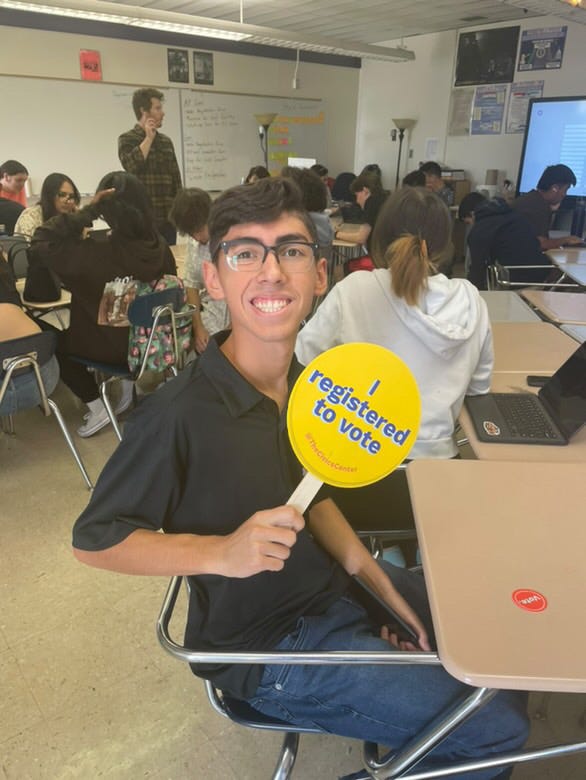
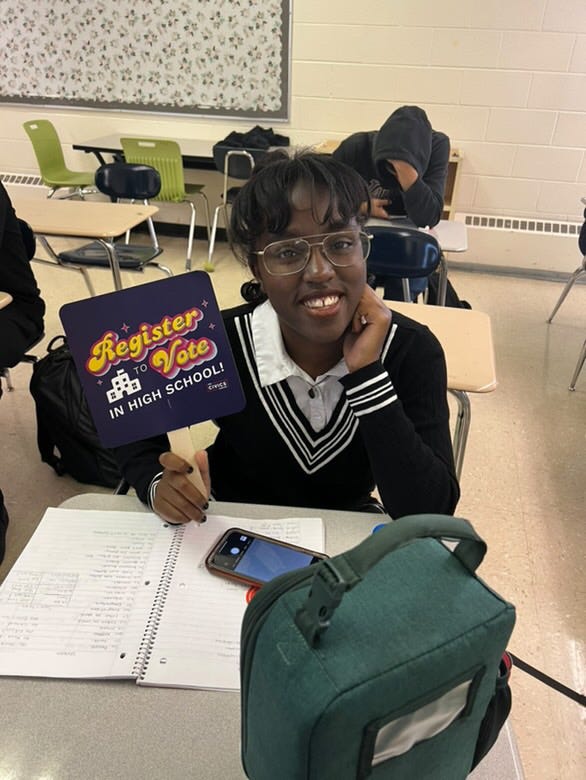
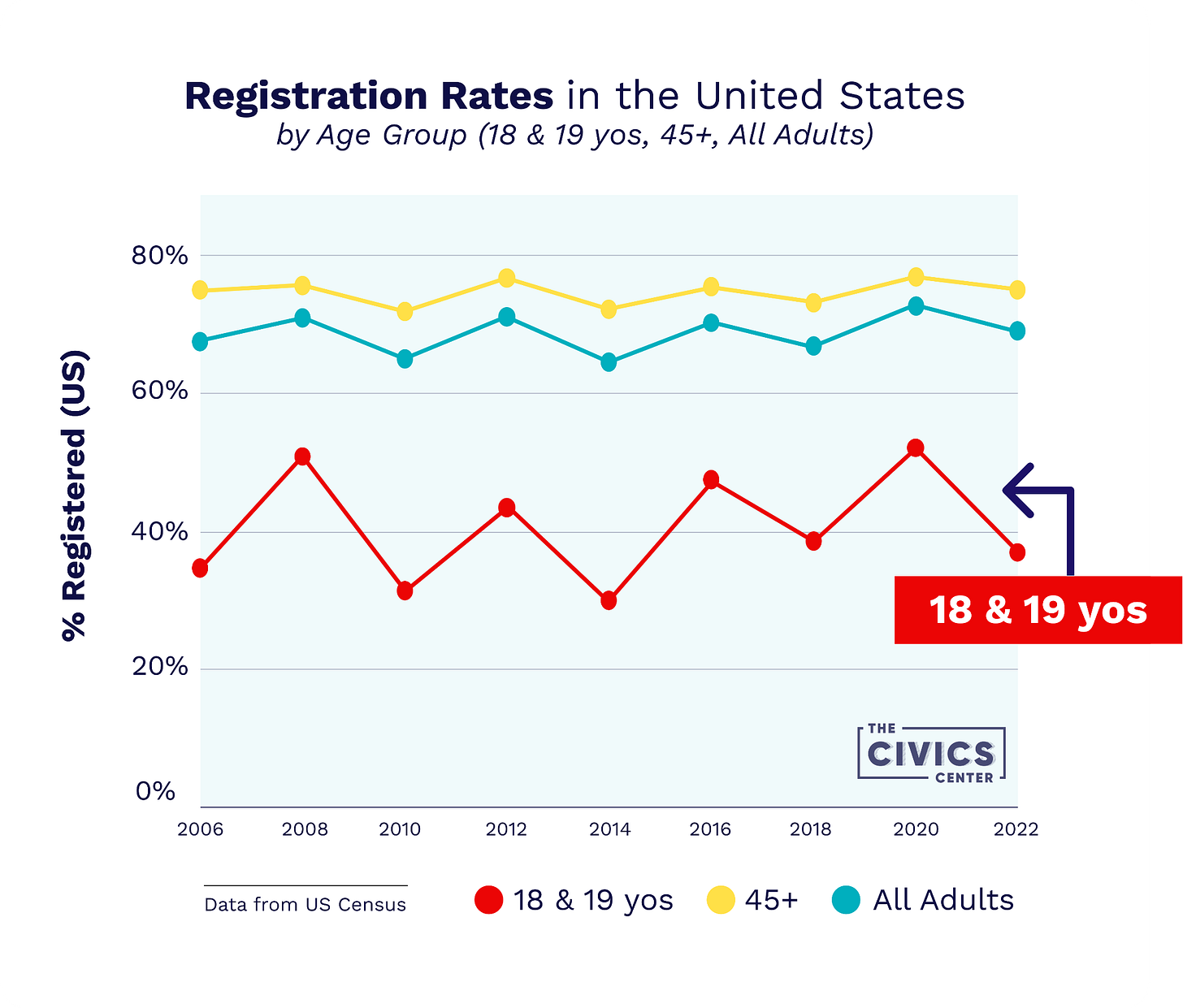
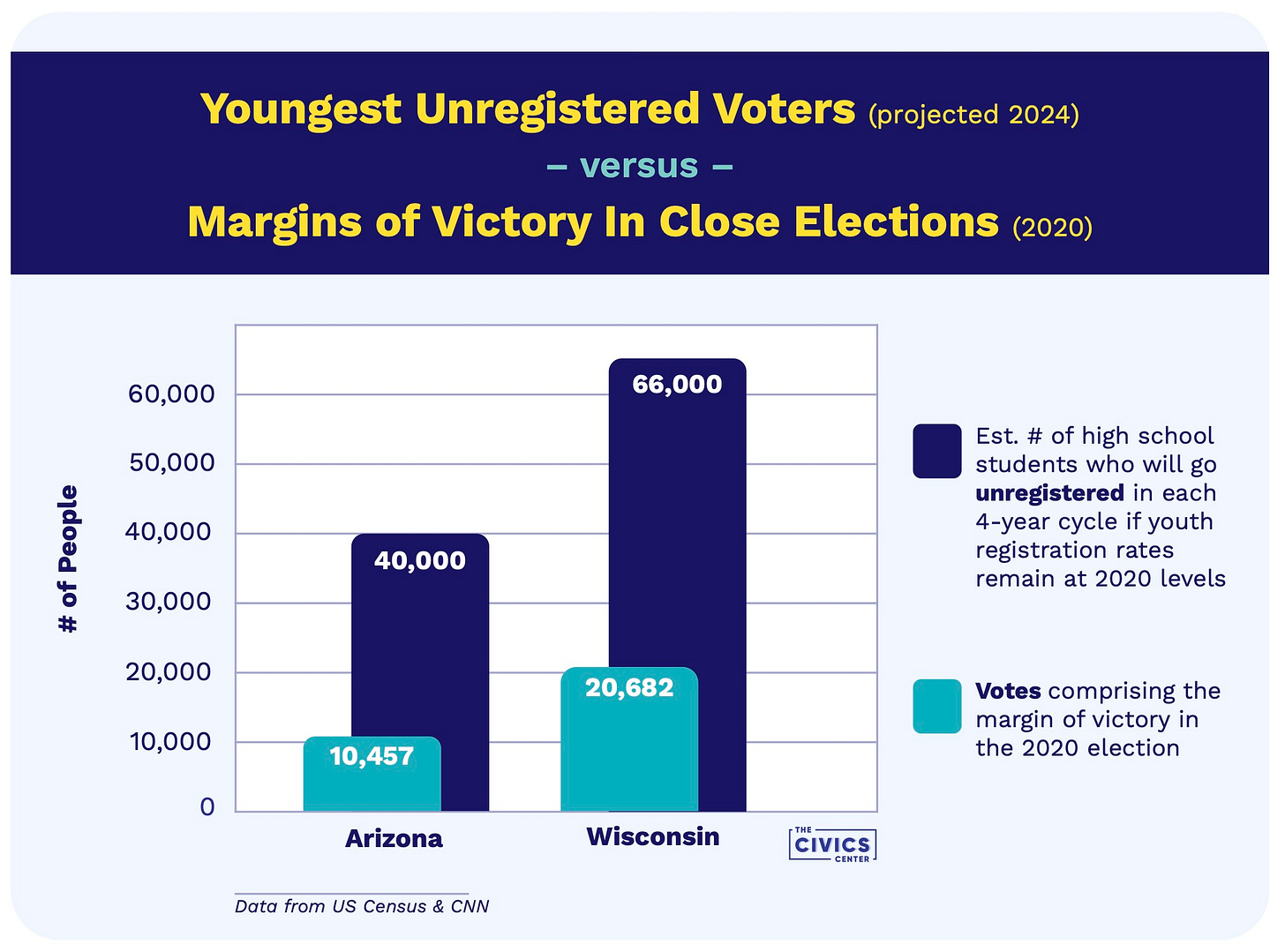
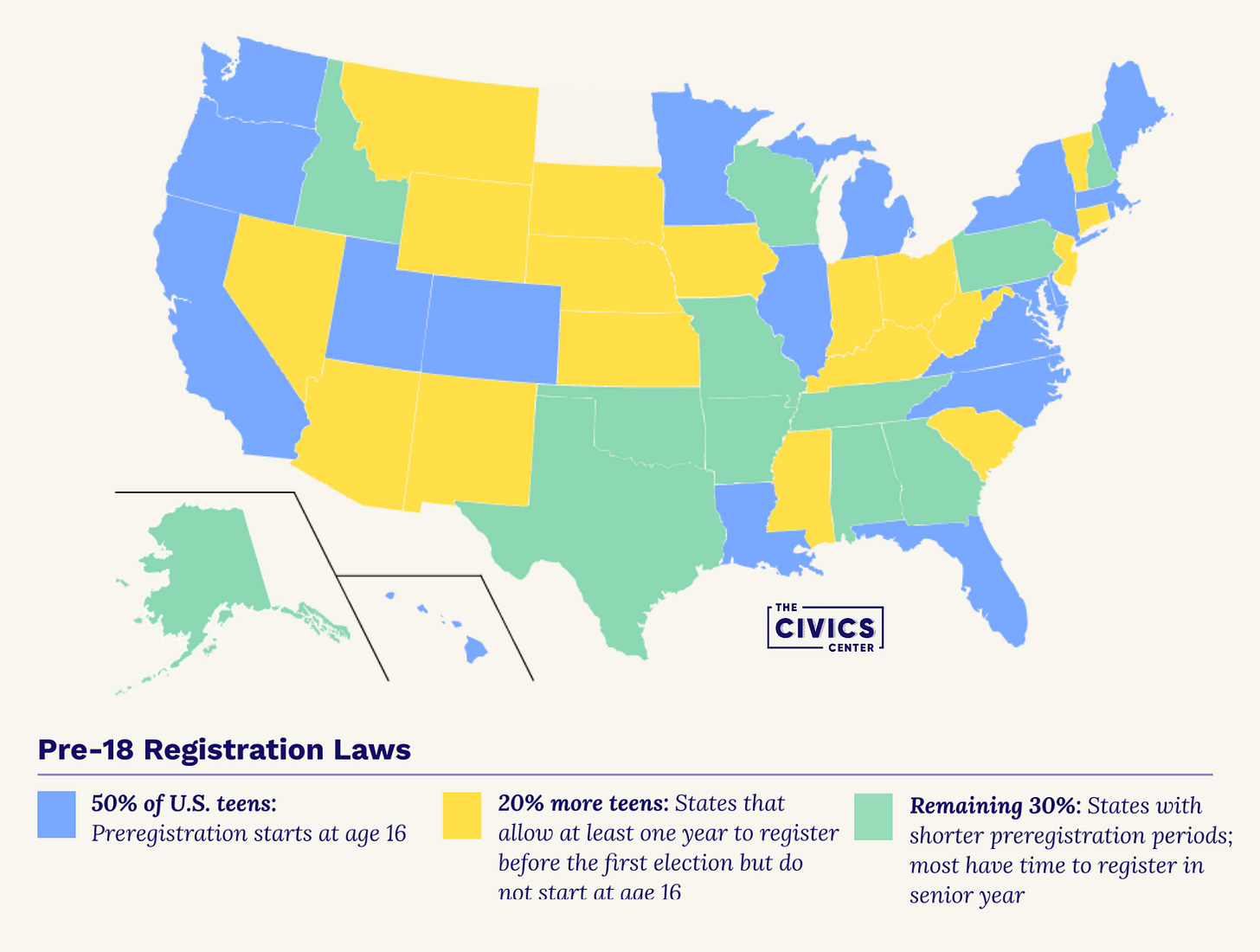
Hi Laura, I'd love to talk with you about The Civics Center partisipating (partnering) in the National Student Mock Election. Let's talk.
This is great! Thanks for outlining so many specific ways we can help